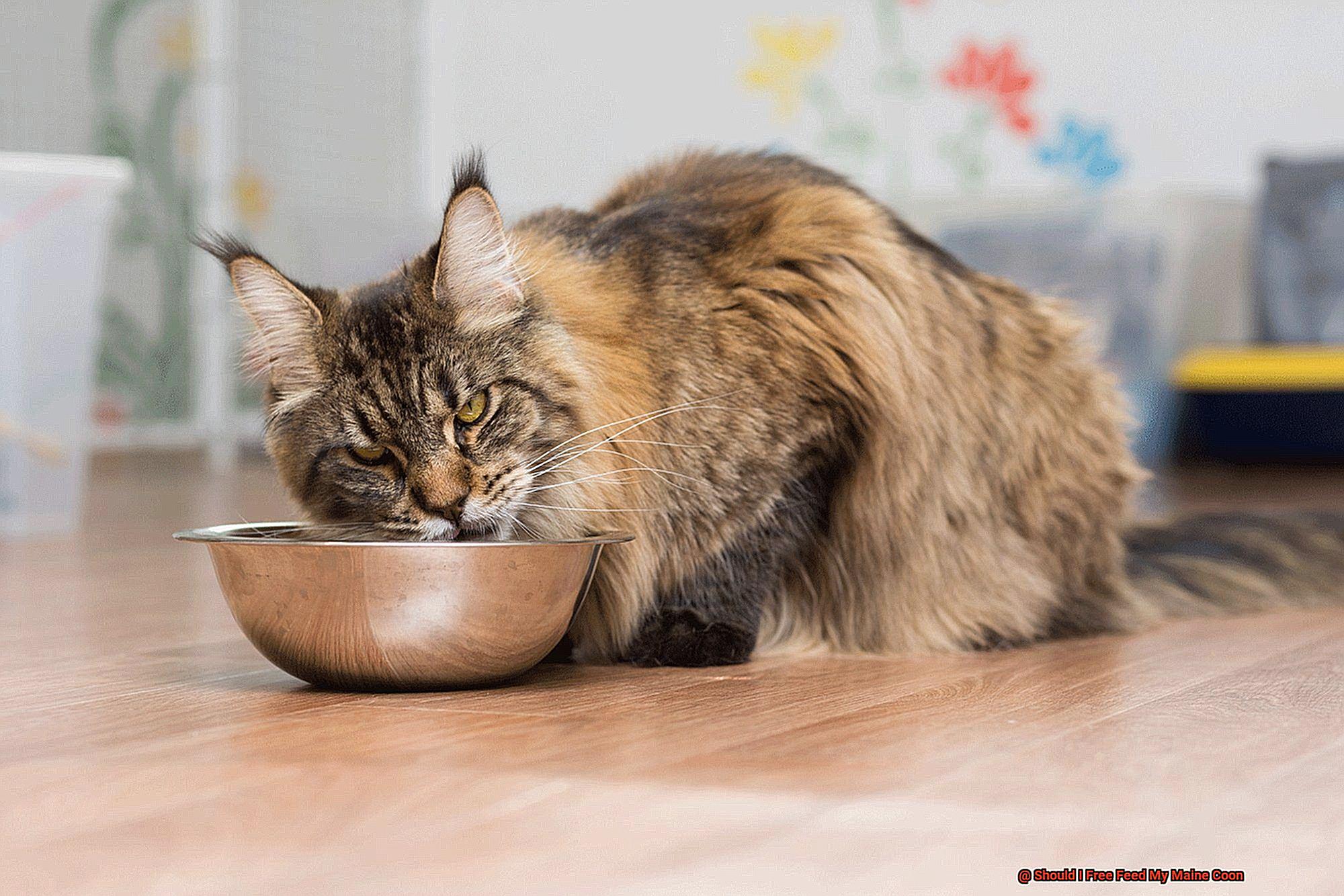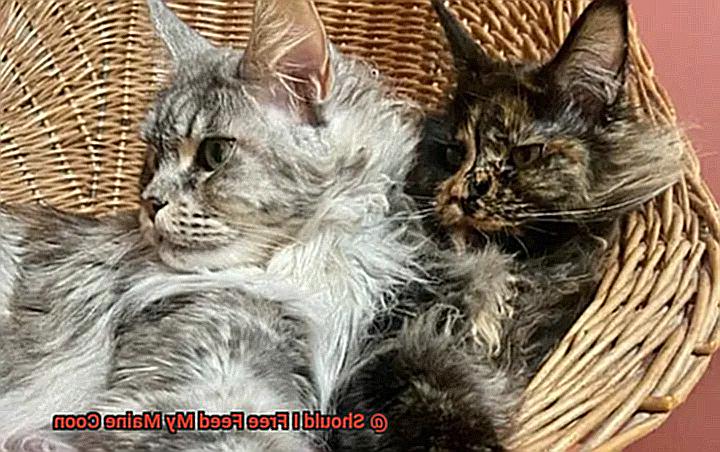Maine Coons are the cat’s meow when it comes to feline companions. With their stunning appearance and outgoing personalities, they’re adored by cat enthusiasts worldwide. But as a responsible pet owner, you may be wondering whether free feeding your Maine Coon is a good idea.
Free feeding involves leaving dry food out all day for your kitty to nibble on whenever they please. While it may seem like an easy solution, it can lead to a host of health problems, including obesity, dental issues, and digestive woes. As a result, providing your Maine Coon with high-quality wet food that’s packed with protein should be the cornerstone of their diet.
In this blog post, we’ll explore the pros and cons of free feeding your Maine Coon cat. We’ll arm you with the knowledge you need to make an informed decision that benefits both you and your furry friend. Additionally, we’ll delve into how much food your Maine Coon needs to consume each day and how to ensure they receive a well-rounded and nutritious diet.
Whether you’re already a proud parent of a Maine Coon or considering adopting one soon, this post is chock-full of valuable information that you won’t want to miss. So sit back, relax, and read on to learn more about this fascinating subject.
Advantages of Free Feeding for Maine Coons
One question that often arises is whether free feeding is a good option for your cat. Free feeding means leaving food out for your cat to eat as they please, rather than sticking to a strict feeding schedule. While it may seem like a risky choice, there are several advantages to free feeding that may make it the right choice for your Maine Coon.

One of the most significant benefits of free feeding is that it allows your Maine Coon to regulate their own appetite. With free access to food, they can graze throughout the day and eat as much or as little as they need. This can be particularly helpful for cats who tend to overeat or become overweight.
Another advantage of free feeding is convenience. Busy pet owners may find it challenging to stick to a strict feeding schedule. By leaving food out for your cat, you don’t have to worry about rushing home to feed them at specific times.
Free feeding can also reduce stress and anxiety in cats who may become agitated when their food isn’t available on a strict schedule. When food is always available, your Maine Coon can feel more secure and relaxed.
Lastly, free feeding can help prevent unhealthy eating habits such as bingeing or hoarding food. Your cat will not feel the need to overeat or stash away extra food since it’s always accessible.
However, it’s important to remember that each cat is unique and may require different feeding habits. Consult with your veterinarian before making any significant changes to your cat’s diet or feeding routine. Monitoring your cat’s food intake and ensuring they are not overeating is also crucial.
Disadvantages of Free Feeding for Maine Coons
However, the practice of free feeding – leaving food out all day for your cat to graze on – may not be the best option for your furry companion. While it may seem convenient, there are several disadvantages of free feeding that can negatively impact your Maine Coon’s health and behavior.

One of the most significant drawbacks of free feeding is overeating. Maine Coons are known for their insatiable appetite and can easily become overweight if given unlimited access to food. Obesity can lead to a host of health problems, including diabetes, joint pain, and heart disease. Thus, it’s crucial to regulate your Maine Coon’s food intake and ensure they’re getting a well-balanced diet that meets their nutritional needs.

Another issue with free feeding is its impact on behavior. Cats who graze on food all day tend to lose interest in food during meal times and may even refuse to eat altogether. This grazing behavior can also lead to aggressive behavior towards other cats in the household as they compete for food. By sticking to a regular feeding schedule, you can help your Maine Coon maintain healthy eating habits and prevent any potential behavior issues.
Furthermore, leaving food out all day can attract pests such as ants and rodents into your home. This not only creates an unsanitary environment but also poses health risks to your Maine Coon as they could ingest harmful substances or contract diseases from these pests. By keeping a vigilant eye on your cat’s feeding area and cleaning up any spilled food promptly, you can keep both your home and your cat safe from unwanted guests.

How to Monitor Your Maine Coon’s Food Intake
As a Maine Coon owner, you want to make sure that your furry friend is healthy and happy. One important aspect of their health is their diet. Monitoring their food intake can help prevent overeating and ensure they are getting the appropriate amount of nutrients they need. Here are five ways to monitor your Maine Coon’s food intake and keep their diet on track.
Establish a Feeding Schedule
Feeding your Maine Coon on a schedule can help regulate their appetite and prevent them from overeating. Consult with your veterinarian to determine how much food your cat should be eating based on their age, weight, and activity level. Dividing their meals into smaller portions throughout the day can also help prevent overeating.
Measure Their Portions
Measuring out your Maine Coon’s food can help ensure they are getting the appropriate amount of nutrition they need. Use measuring cups or a kitchen scale to ensure accuracy. This will also help you adjust their portion sizes if needed.
Keep a Food Log
Keeping track of how much your Maine Coon is eating each day can help identify any changes in their appetite or eating habits that may indicate an underlying health issue. It can also help you adjust their portion sizes if needed.
Choose High-Quality Cat Food
Providing your Maine Coon with high-quality cat food that is specifically formulated for their breed can help ensure they are getting the appropriate balance of nutrients and calories they need. Avoid feeding them table scraps or human food, as this can disrupt their diet and lead to weight gain.
Monitor Their Weight
Weighing your Maine Coon regularly can help you determine if they are gaining or losing weight, which can be an indication of a problem with their diet or health. If you notice any significant changes in their weight or appetite, it’s important to consult with your veterinarian for guidance.
How to Ensure Your Maine Coon Gets the Right Nutrition Without Overfeeding
One important aspect of their overall well-being is their diet. In order to avoid overfeeding your Maine Coon, it’s crucial to establish a feeding routine that works for both you and your cat. Here are five tips to ensure your Maine Coon gets the right nutrition without overeating.
Say No to Free-Feeding
Free-feeding might seem convenient, but it can lead to overeating and weight gain. Instead, establish a feeding schedule and measure out appropriate portions for your cat. This not only ensures they receive the right amount of nutrition but also helps with weight management.
Choose High-Quality Food Options
Maine Coons require a high protein diet, so it’s important to choose high-quality food options that meet their nutritional needs. Look for food that is rich in protein and low in carbohydrates while avoiding foods with fillers or artificial preservatives.
Provide Fresh Water

Just like humans, cats need water for proper hydration and overall health. Make sure to provide fresh water at all times by investing in a water fountain or providing multiple sources of water throughout your home to encourage your cat to drink more.
Feed Small Meals Throughout the Day
Instead of free-feeding, provide your Maine Coon with two or three small meals per day. This will not only help them maintain a healthy weight but will also prevent them from getting bored with their food. Be sure to measure their portions to avoid overeating.
Choose Well-Balanced Diets
Look for cat food that is specifically formulated for Maine Coons or large breed cats. These foods typically contain a higher percentage of protein and lower percentage of carbohydrates while ensuring all essential nutrients are included.
Potential Health Risks Associated With Free Feeding Maine Coons
Although it may seem like a convenient option, free feeding can actually lead to a number of health issues for your Maine Coon.
One issue that is especially common in this breed is overeating and obesity. Maine Coons are already susceptible to weight gain, and constant access to food can make things worse. Obesity can lead to joint pain, diabetes, and heart disease – all of which can significantly impact your Maine Coon’s quality of life.
In addition to overeating, free feeding can also cause dental problems in Maine Coons. When food particles linger in their teeth for extended periods of time, it can cause plaque buildup and eventually tooth decay. This can be painful and uncomfortable for your furry friend, making it difficult for them to enjoy their food.
Another potential health risk associated with free feeding is food spoilage. Dry food left out for too long can become stale and lose its nutritional value, potentially leading to malnutrition in your Maine Coon.
Lastly, free feeding can attract unwanted pests such as ants and rodents into your home – posing a danger not only to your Maine Coon but also to other household members.
87sQ5AF6wSM” >
Also Read: Can Cats Control Their Eating?
Conclusion
In conclusion, while free feeding your Maine Coon may seem like a hassle-free option, it can have detrimental effects on their health. Overeating, obesity, dental problems, and digestive issues are just a few of the potential risks associated with free feeding.
To ensure your feline friend is getting the best possible nutrition, it’s important to provide them with high-quality wet food that’s rich in protein. Establishing a regular feeding schedule and portion control can help regulate their appetite and prevent overeating.
Additionally, choosing well-balanced diets that meet their nutritional needs and providing fresh water at all times are essential for maintaining your Maine Coon’s overall health. Keeping track of their food intake through a food log and monitoring their weight regularly can also help identify any changes in eating habits that may indicate an underlying health issue.
As a responsible pet owner, it’s important to consult with your veterinarian before making any significant changes to your cat’s diet or feeding routine.







